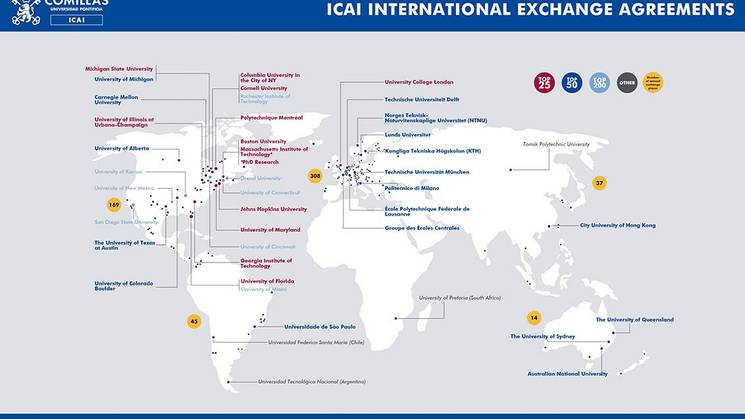Máster Universitario en Ingeniería de Telecomunicación y Master’s in Smart Grids
Especialización en las Smart Grids y la transformación digital del sector

¿Qué puede ofrecerte el Máster?
El programa doble formado por el Máster en Ingeniería de Telecomunicación y el Master's in Smart Grids, impartido por Strathclyde University y Comillas ICAI en estrecha colaboración con Iberdrola , combina industria y academia para aportar al alumno una formación genérica en ingeniería telemática, que se completa con la especialización en redes eléctricas inteligentes o smart grids, una de las revoluciones del sector energético.
El objetivo es responder a la creciente demanda de ingenieros para liderar el proceso de digitalización de la red eléctrica. Los alumnos contarán con una comprensión detallada de la operación y planificación de las redes eléctricas bajo el nuevo paradigma de las smart grids.
Los alumnos pasarán un semestre en España y un semestre en Escocia; además, realizarán las prácticas (de mayo a agosto) en empresas punteras como Iberdrola, Scottish Power Energy Networks (Glasgow), Minsait, Naturgy y Gridespertise.
- FacultadIngeniería (Comillas ICAI)
- IdiomasInglés, Español
- CertificaciónMáster Oficial + Máster Propio
- ModalidadPresencial
- Duración2 años (187,5 ECTS)
- Fecha de inicio01/09/2026
¿Tienes dudas?
Si necesitas más información puedes rellenar el siguiente formulario y recibirás información de este programa.
Ven a conocernos desde cerca y descubre toda la oferta académica y la experiencia universitaria que te espera.
¡Estamos deseando conocerte!
Sesiones Informativas
Conoce el programa
¿Qué nos diferencia?
Empleabilidad
Tasa de ocupación de los titulados de Comillas ICAI
Prácticas profesionales
Alumnos que hacen prácticas obligatorias y remuneradas
Claustro
Docentes que compatibilizan clases con ejercicio profesional
Plan de estudios
Proyección profesional
El Máster en Ingeniería de Telecomunicación habilita para la profesión regulada de Ingeniero de Telecomunicación, según la normativa vigente. Con este doble programa podrás optar a diversas salidas profesionales:
Operador de red de transporte
Operador de red de transporte
Comercializadores y agregadores
Reguladores y agencias gubernamentales
Institutos de investigación e innovación
Consultores del sector energético
I+D+i

Con este programa podrás liderar la digitalización de la red eléctrica

Prácticas profesionales
Te preparamos para tu futuro y te introducimos en el mundo real con experiencias laborales formativas completas.
Se realizarán las prácticas (de mayo a agosto) en empresas punteras como Iberdrola, Scottish Power Energy Networks (Glasgow), Minsait, Naturgy y Gridespertise.

Un respiro Internacional
Los programas de movilidad internacional durante el máster tienen dos modalidades: un intercambio académico en una universidad extranjera europea a través del Programa Erasmus+ o de otros países con los que Comillas tiene suscrito un Convenio Bilateral, o bien unas prácticas internacionales para tener una experiencia laboral en el extranjero.

Proceso de admisión
Sigue todos los pasos de nuestro proceso de admisión y conviértete en estudiante de Comillas.
Solicitud de admisión
Rellena el formulario con tus datos y aporta los documentos acreditativos del cumplimiento de los requisitos de acceso.
Validación
Secretaría General revisará la documentación y se te comunicará la validación.
Entrevista
Los candidatos realizarán las entrevistas de acceso.
Resolución
Te comunicaremos si has sido admitido.
Matriculación
Serás oficialmente un estudiante de Comillas.
- 01
Solicitud de admisión
Rellena el formulario con tus datos y aporta los documentos acreditativos del cumplimiento de los requisitos de acceso.
- 02
Validación
Secretaría General revisará la documentación y se te comunicará la validación.
- 03
Entrevista
Los candidatos realizarán las entrevistas de acceso.
- 04
Resolución
Te comunicaremos si has sido admitido.
- 05
Matriculación
Serás oficialmente un estudiante de Comillas.
- 01
Solicitud de admisión
Rellena el formulario con tus datos y aporta los documentos acreditativos del cumplimiento de los requisitos de acceso.
- 02
Validación
Secretaría General revisará la documentación y se te comunicará la validación.
- 03
Entrevista
Los candidatos realizarán las entrevistas de acceso.
- 04
Resolución
Te comunicaremos si has sido admitido.
- 05
Matriculación
Serás oficialmente un estudiante de Comillas.
- 01
Solicitud de admisión
Rellena el formulario con tus datos y aporta los documentos acreditativos del cumplimiento de los requisitos de acceso.
- 02
Validación
Secretaría General revisará la documentación y se te comunicará la validación.
- 04
Resolución
Te comunicaremos si has sido admitido.
- 03
Entrevista
Los candidatos realizarán las entrevistas de acceso.
- 05
Matriculación
Serás oficialmente un estudiante de Comillas.
Información económica y becas
Escocia, Reino Unido y países de la Unión Europea - Máster completo: 49.194€
Resto de países del mundo - Máster completo: 53.873€
- 10% de reducción para antiguos alumnos.
- Iberdrola ofrecerá un conjunto de becas para los alumnos más prometedores que se incorporen al máster. Abierto el plazo para solicitar becas Iberdrola.
- Prácticas remuneradas.
| País de origen del alumno | Curso | Precio total por curso | Matrícula | 8 mensualidades |
|---|---|---|---|---|
| Escocia, Reino Unido y países de la Unión Europea | 1º | 20.357,28€ | 3.434,40€ | 2.115,36€ |
| 2º | 28.836,42€ | 4.862,34€ | 2.996,76€ | |
| Resto de países del mundo | 1º | 22.291,92€ | 3.543,12€ | 2.343,60€ |
| 2º | 31.581,24€ | 5.020,44€ | 3.320,10€ |
Información para el alumno
Salidas profesionales y académicas
Perfil de egreso
Los egresados del Master in Smart Grids serán ingenieros con amplios conocimientos tanto en el campo de las telecomunicaciones como en el de los sistemas de energía.
Esta mezcla de conocimientos se hace posible gracias a la combinación entre excelencia académica en dos instituciones universitarias con reconocimiento internacional y la participación en proyectos reales durante el periodo de prácticas.
Salidas profesionales:
- Empresas eléctricas: Operador de red de transporte, operador de red de distribución, comercializadores, agregadores y nuevos negocios relacionados con los recursos distribuidos.
- Reguladores y agencias gubernamentales.
- Institutos de investigación e innovación.
- Consultores del sector energético.
Salidas académicas
- Investigación, desarrollo e innovación
- Estudios de doctorado

Comillas ICAI
Alberto Aguilera, 25
28015 Madrid
La tradición de la Escuela Técnica Superior de Ingeniería (Comillas ICAI) en la formación de ingenieros comienza en Madrid en 1908. En la actualidad, Comillas ICAI es una escuela politécnica cuya actividad académica se centra en Ingeniería Industrial y de Telecomunicación.
Calidad y normativa
Información oficial del título
Documentación informativa relacionada con el carácter oficial del título
Sistema de gestión de calidad
Seguimiento del título - Composición de la Junta de Escuela:
Estudios relacionados
Preguntas frecuentes
Debido a que los estudios de Comillas tienen una alta demanda y a que las plazas están limitadas, hay que seleccionar a los mejores candidatos con pruebas de admisión.
Cada clase tiene su tutor, cuya función es integrar al alumno en el grupo y prestar atención a su adecuado rendimiento académico. Además, en Comillas el sistema docente se distingue, entre otras características, por la atención personalizada y la relación fluida y permanente entre profesores y alumnos.
El sistema de enseñanza de Comillas está especialmente orientado a la relación con la realidad de las empresas, instituciones y organismos y del ejercicio profesional. El Servicio de Orientación en Carreras Profesionales, Prácticas y Empleo (OPE) se encarga de facilitar a los alumnos la realización de prácticas relacionadas con sus estudios para enriquecer su formación. En el curso 2022-23, se gestionaron 7.101 prácticas de alumnos en empresas.
El Servicio de Orientación en Carreras Profesionales, Prácticas y Empleo (OPE) es el servicio de la universidad dedicado a informar, orientar y colaborar en la inserción en el mercado laboral de los recién titulados o en la proyección de la carrera profesional de egresados de Comillas, para ello dispone de una herramienta on-line que pone en relación directamente a los candidatos con 8.302 empresas con las que Comillas mantiene relación. Durante el curso 2022-23 se gestionaron 1.542 ofertas de empleo. Del total de titulados de la promoción 2021, el 92% está ocupado, bien trabajando o ampliando estudios, en los seis meses siguientes a la terminación de sus estudios.

Contáctanos si necesitas ayuda
Oficina de Futuros Alumnos
C/ Alberto Aguilera, 21 - 28015 Madrid
Tel.: (+34) 91 540 61 32
Fax: (+34) 91 559 65 69
futurosalumnos@comillas.edu
Responsables del programa
Director MIT: Rafael Palacios
Director MSG: Miguel Ángel Sánchez Fornié
Coordinador MSG: Javier Matanza Domingo





